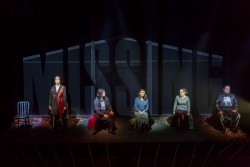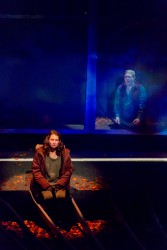 It’s not many operas where the audience, at the end of a performance, remains on its feet following a standing ovation to chant along to a surprise denouement, in this case the Women’s Warrior Song, led by an Indigenous woman beating a round, animal-hide hand drum. Many audience members took up the mesmerizing chant, until the song and drumming ceased.
It’s not many operas where the audience, at the end of a performance, remains on its feet following a standing ovation to chant along to a surprise denouement, in this case the Women’s Warrior Song, led by an Indigenous woman beating a round, animal-hide hand drum. Many audience members took up the mesmerizing chant, until the song and drumming ceased.
A dirge of pain, rage and healing, the Women’s Warrior Song is heard at marches commemorating Canada’s missing and murdered Indigenous women. The spirit of the song has been reimagined as the one-act chamber opera Missing, a City Opera Vancouver creation, overseen by artistic director Charles Barber, which premiered November 3 at the York Theatre in Vancouver and continues until November 11. It then moves to Victoria’s Baumann Centre for Opera, for six shows starting November 17.
Missing breaks with much classical opera not only in its bold subject matter – racism against native peoples as well as the ongoing tragedy of Canada’s missing and murdered Indigenous women – but also its sparse, eloquent storytelling, complemented by a minimalist set design, that delves into magic realism and metaphor as a means to express pain and, possibly, redemption. It is also unique in that four of the seven opera singers are Indigenous, while the libretto is written partly in Gitxsan, an Indigenous language spoken in northwestern British Columbia. In the hands of librettist Marie Clements of Vancouver, an award-winning Métis writer, director, producer and playwright, words become as powerful as arrows, each one piercing deep-seated emotions, from guilt, sorrow and enlightenment among white viewers to – for Indigenous members of the audience – grief and a sense of vindication from having the suffering of one’s community acknowledged and honoured in a public setting.
The power of Missing’s libretto is magnified by the equally spare music of Toronto-based JUNO Award-winning composer Brian Current, whose sublime score – conducted here by Timothy Long – soars and plummets in unison with the fierce complexity of emotions that are brought to bear through the telling of this tragic tale.
To underscore the immensity of the tragedy, Missing reveals early in the libretto that 1,200 Indigenous women have been murdered or disappeared in Canada. Such a grim but abstract figure is made accessible by telling two linked, but very different, tales. One is the suffering of an Indigenous family whose daughter, a high school student, goes missing while hitchhiking along BC’s Highway 16, known as the Highway of Tears, a lonely northern forest roadway where possibly dozens of native women have vanished. The other story arc is a masterful rendering of the chasm that divides Canada’s European and Indigenous cultures, and exposes white culture’s blasé attitude towards the missing and murdered. This thread is expressed through the near-death experience of Ava, a law student from Vancouver, whose car goes off the road during a nighttime drive along Highway 16.
 Sustaining horrific injuries in the crash, Ava’s car lands near the place where the native high school teen has been murdered and her corpse abandoned. The dead teenager, played with ethereal grace by coloratura soprano Melody Courage, has seemingly left an imprint that haunts the dark forest. In that moment, with her body broken, Ava somehow absorbs both the horror of the slaying and with it, the spirit of the murdered girl.
Sustaining horrific injuries in the crash, Ava’s car lands near the place where the native high school teen has been murdered and her corpse abandoned. The dead teenager, played with ethereal grace by coloratura soprano Melody Courage, has seemingly left an imprint that haunts the dark forest. In that moment, with her body broken, Ava somehow absorbs both the horror of the slaying and with it, the spirit of the murdered girl.
Ava is performed by soprano Caitlin Wood with exquisite vulnerability as the young law student who is struggling to heal, beset by nightmares and flashbacks to inexplicable events. When she resumes law school in Vancouver a year after the accident, it becomes evident she has been transformed; she is inscrutable to best friend and fellow law student Jess, whose sense of white entitlement and opaque racism is played with artful subtlety by mezzo-soprano Heather Malloy.
Ava doesn’t support Jess’s bigoted challenge to Indigenous guest lecturer Dr. Wilson, played with dignity and power by mezzo-soprano Marion Newman, whose discussion of entrenched racism highlights the inherent injustice of Canada’s legal system. This leads to a rift between Jess and Ava, expressed in a soaring, bitter duet that is both heartbreaking and magnificent to watch.
Much later, when Ava gives birth to a baby and finds her mental equilibrium uprooted by the child’s chronic crying, the native teen once again permeates her consciousness. The murdered girl gives Ava the horrifying details of her final moments and laments what she will never experience: love, a family and unfulfilled ambitions to become a lawyer.
Missing is an extraordinarily moving and thought-provoking work, and a milestone for the opera world. It has taken a painful and horrifying topic and rendered it into accessible art. Ultimately, its message is a universal one: open our eyes and hearts to each other’s pain. By doing so, humanity has a chance for healing and redemption. Missing begins this healing journey in a magnificent mélange of singing, acting and music that, one hopes, will be seen by audiences across Canada and the world.
Missing premiered at City Opera Vancouver on November 3 and runs until November 11, 2017, followed by a run at Pacific Opera Victoria from November 17 to 26, 2017. This report on Missing is part of a series of articles on thewholenote.com on music in the Vancouver area, in light of the Vancouver-based ISCM 2017 festival this month.
Roberta Staley is a Vancouver-based independent magazine writer and editor and documentary filmmaker.



